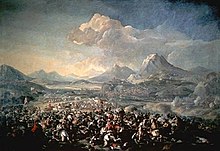Catalan Revolt
| Catalan revolt Part of the Franco-Spanish War |
|||||||||
|---|---|---|---|---|---|---|---|---|---|
 Battle of Montjuïc (1641) |
|||||||||
|
|||||||||
| Belligerents | |||||||||
|
|
|
||||||||
| Commanders and leaders | |||||||||
|
|
|
||||||||
The Catalan revolt (Catalan: Guerra dels Segadors, Eastern Catalan: [ˈɡɛrə ðəɫs səɣəˈðos], Western Catalan: [ˈɡɛrɛ ðeɫs seɣaˈðos]; meaning in English "Reapers' War") affected a large part of the Principality of Catalonia between the years of 1640 and 1659. It had an enduring effect in the Treaty of the Pyrenees (1659), which ceded the County of Roussillon and the northern half of the County of Cerdanya to France (see French Cerdagne), splitting these northern Catalan territories off from the Principality of Catalonia and the Crown of Aragon, and thereby receding the borders of Spain to the Pyrenees.
The war had its roots in the discomfort generated in Catalan society by the presence of Castilian troops during the Franco-Spanish War between the Kingdom of France and the Monarchy of Spain as part of the Thirty Years' War. Gaspar de Guzmán, Count-Duke of Olivares, the chief minister of Philip IV, had been trying to distribute more evenly the huge economic and military burden of the Spanish Empire, until then supported mainly by the Crown of Castile. But his Union of Arms (Spanish: Union de Armas) policy raised hostilities and protests all across the countries of Spain. Catalan peasants, who were forced to quarter Castilian troops, responded on Corpus Christi day, May 1640, with an uprising known as 'Bloody Corpus' (Catalan: Corpus de Sang), under the slogans "Long live the faith of Christ!", "Long live the land, death to bad government". This 'Bloody Corpus' which began with the death of a reaper (Catalan: segador), and led to the somewhat mysterious death of Dalmau de Queralt, Count of Santa Coloma and Spanish viceroy of Catalonia, marked the beginning of the conflict. The irregular militia involved were known as 'Miquelets'. The situation took Olivares by surprise, with most of the Spanish army fighting on other fronts far from Catalonia.
...
Wikipedia
